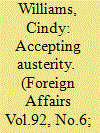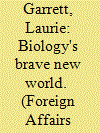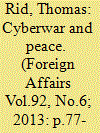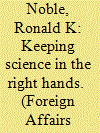|
|
|
Sort Order |
|
|
|
Items / Page
|
|
|
|
|
|
|
| Srl | Item |
| 1 |
ID:
124645


|
|
|
|
|
| Publication |
2013.
|
| Summary/Abstract |
On March 1, 2013, the U.S. Department of Defense lost $37 billion overnight to sequestration. The cut marked the first wave of a series of planned cutbacks that will shrink future budgets across the federal government by about $1 trillion over nine years. The reductions had been set in motion back in 2011, when a special "super committee" established by the Budget Control Act (BCA) failed to reach a deficit-reduction agreement, triggering automatic cuts designed to punish both parties. Unlike other budget cuts, sequestration is implemented across the board, taking the same percentage bite out of every account. Except for the decision to spare the military personnel account that provides the pay for the United States' men and women in uniform, defense leaders had no choice about where to take the 2013 cuts. And so, with just seven months left in the fiscal year, sequestration abruptly erased about eight percent of the the Pentagon's budget for the year.
|
|
|
|
|
|
|
|
|
|
|
|
|
|
|
|
| 2 |
ID:
124636


|
|
|
|
|
| Publication |
2013.
|
| Summary/Abstract |
In May 2010, the richest, most powerful man in biotechnology made a new creature. J. Craig Venter and his private-company team started with DNA and constructed a novel genetic sequence of more than one million coded bits of information known as nucleotides. Seven years earlier, Venter had been the first person in history to make a functioning creature from information. Looking at the strings of letters representing the DNA sequence for a virus called phi X174, which infects bacteria, he thought to himself, "I can assemble real DNA based on that computer information." And so he did, creating a virus based on the phi X174 genomic code. He followed the same recipe later on to generate the DNA for his larger and more sophisticated creature. Venter and his team figured out how to make an artificial bacterial cell, inserted their man-made DNA genome inside, and watched as the organic life form they had synthesized moved, ate, breathed, and replicated itself.
|
|
|
|
|
|
|
|
|
|
|
|
|
|
|
|
| 3 |
ID:
124657


|
|
|
|
|
| Publication |
2013.
|
| Summary/Abstract |
International development has moved beyond charity. Gone are the days when the United States would just spend its seemingly bottomless largess to help less fortunate or vanquished countries, as it did after World War II. International development has reached a new, globally competitive stage, bringing with it enormous strategic and economic implications for the United States in the years ahead.
According to the Organization for Economic Cooperation and Development (OECD), the global middle class will grow from an estimated 1.8 billion people in 2009 to 4.9 billion in 2030. Nearly all of that growth will occur outside Europe and North America, from Brazil, China, and India to countries in the Middle East, North Africa, and Southeast Asia. Eighty-five percent of the growth will come in the Asia-Pacific region alone. The priorities of those countries will change along with their demographics. With more people escaping poverty, governments' focus is shifting from meeting basic needs to ensuring longer-term economic prosperity. Instead of handouts, nations are looking for investments to keep their middle classes employed. And more often than not, those investments are for infrastructure that enables and sustains growth.
|
|
|
|
|
|
|
|
|
|
|
|
|
|
|
|
| 4 |
ID:
124652


|
|
|
|
|
| Publication |
2013.
|
| Summary/Abstract |
Cyberwar Is Coming!" declared the title of a seminal 1993 article by the RAND Corporation analysts John Arquilla and David Ronfeldt, who argued that the nascent Internet would fundamentally transform warfare. The idea seemed fanciful at the time, and it took more than a decade for members of the U.S. national security establishment to catch on. But once they did, a chorus of voices resounded in the mass media, proclaiming the dawn of the era of cyberwar and warning of its terrifying potential. In February 2011, then CIA Director Leon Panetta warned Congress that "the next Pearl Harbor could very well be a cyberattack." And in late 2012, Mike McConnell, who had served as director of national intelligence under President George W. Bush, warned darkly that the United States could not "wait for the cyber equivalent of the collapse of the World Trade Centers."
|
|
|
|
|
|
|
|
|
|
|
|
|
|
|
|
| 5 |
ID:
124650


|
|
|
|
|
| Publication |
2013.
|
| Summary/Abstract |
The United States is now in a period of austerity, and after years of huge increases, the defense budget is set to be scaled back. Even those supporting the cuts stress the need to avoid the supposedly awful consequences of past retrenchments. "We have to remember the lessons of history," President Barack Obama said in January 2012. "We can't afford to repeat the mistakes that have been made in the past -- after World War II, after Vietnam -- when our military policy was left ill prepared for the future. As commander in chief, I will not let that happen again." Similarly, then Secretary of Defense Leon Panetta told Congress in October 2011, "After every major conflict -- World War I, World War II, Korea, Vietnam, the fall of the Soviet Union -- what happened was that we ultimately hollowed out the force. Whatever we do in confronting the challenges we face now on the fiscal side, we must not make that mistake."
|
|
|
|
|
|
|
|
|
|
|
|
|
|
|
|
| 6 |
ID:
124661


|
|
|
|
|
| Publication |
2013.
|
| Summary/Abstract |
Of all the threats looming over the planet today, one of the most alarming is the seemingly inexorable descent of the world's oceans into ecological perdition. Over the last several decades, human activities have so altered the basic chemistry of the seas that they are now experiencing evolution in reverse: a return to the barren primeval waters of hundreds of millions of years ago.
A visitor to the oceans at the dawn of time would have found an underwater world that was mostly lifeless. Eventually, around 3.5 billion years ago, basic organisms began to emerge from the primordial ooze. This microbial soup of algae and bacteria needed little oxygen to survive. Worms, jellyfish, and toxic fireweed ruled the deep. In time, these simple organisms began to evolve into higher life forms, resulting in the wondrously rich diversity of fish, corals, whales, and other sea life one associates with the oceans today.
Yet that sea life is now in peril. Over the last 50 years -- a mere blink in geologic time -- humanity has come perilously close to reversing the almost miraculous biological abundance of the deep. Pollution, overfishing, the destruction of habitats, and climate change are emptying the oceans and enabling the lowest forms of life to regain their dominance. The oceanographer Jeremy Jackson calls it "the rise of slime": the transformation of once complex oceanic ecosystems featuring intricate food webs with large animals into simplistic systems dominated by microbes, jellyfish, and disease. In effect, humans are eliminating the lions and tigers of the seas to make room for the cockroaches and rats.
The prospect of vanishing whales, polar bears, bluefin tuna, sea turtles, and wild coasts should be worrying enough on its own. But the disruption of entire ecosystems threatens our very survival, since it is the healthy functioning of these diverse systems that sustains life on earth. Destruction on this level will cost humans dearly in terms of food, jobs, health, and quality of life. It also violates the unspoken promise passed from one generation to the next of a better future.
|
|
|
|
|
|
|
|
|
|
|
|
|
|
|
|
| 7 |
ID:
124635


|
|
|
|
|
| Publication |
2013.
|
| Summary/Abstract |
The U.S. government seems outraged that people are leaking classified materials about its less attractive behavior. It certainly acts that way: three years ago, after Chelsea Manning, an army private then known as Bradley Manning, turned over hundreds of thousands of classified cables to the anti-secrecy group WikiLeaks, U.S. authorities imprisoned the soldier under conditions that the UN special rapporteur on torture deemed cruel and inhumane. The Senate's top Republican, Mitch McConnell, appearing on Meet the Press shortly thereafter, called WikiLeaks' founder, Julian Assange, "a high-tech terrorist."
|
|
|
|
|
|
|
|
|
|
|
|
|
|
|
|
| 8 |
ID:
124638


|
|
|
|
|
| Publication |
2013.
|
| Summary/Abstract |
Ongoing research and discoveries in the life sciences -- the latest and most promising involving synthetic biology -- have led to extraordinary advances that will benefit society. But criminals and terrorists could manipulate such advances to disrupt public safety and national security. Since its founding in 1923, Interpol has learned that the most effective way to keep up with a constantly changing world is by engaging law enforcement and consulting experts in its 190 member countries. Effective solutions to new global security threats require the exchange of information and intelligence. As the methods criminals employ have developed, so, too, has Interpol's capacity for deploying new strategies and offering assistance to stop them.
|
|
|
|
|
|
|
|
|
|
|
|
|
|
|
|
| 9 |
ID:
124633


|
|
|
|
|
| Publication |
2013.
|
| Summary/Abstract |
Ever since Congress passed the Immigration Reform and Control Act, in 1986, attempts at a similar comprehensive reform of U.S. immigration policies have failed. Yet today, as the Republican Party smarts from its poor performance among Hispanic voters in 2012 and such influential Republicans as former Florida Governor Jeb Bush have come out in favor of a new approach, the day for comprehensive immigration reform may seem close at hand. President Barack Obama was so confident about its prospects that he asked for it in his State of the Union address in February 2013. Now, the U.S. Senate looks poised to offer illegal immigrants a pathway to citizenship.
|
|
|
|
|
|
|
|
|
|
|
|
|
|
|
|
| 10 |
ID:
124634


|
|
|
|
|
| Publication |
2013.
|
| Summary/Abstract |
When the global financial crisis hit in 2008, social democrats in Europe believed that their moment had finally arrived. After a decade in which European politics had drifted toward the market-friendly policies of the right, the crisis represented an opportunity for the political center left's champions of more effective government regulation and greater social justice to reassert themselves.
|
|
|
|
|
|
|
|
|
|
|
|
|
|
|
|
| 11 |
ID:
124653


|
|
|
|
|
| Publication |
2013.
|
| Summary/Abstract |
It was a call I never expected to receive. I had just returned home from playing indoor tennis on the chilly, windy Sunday afternoon of March 16, 2008. A senior official of the U.S. Federal Reserve Board of Governors was on the phone to discuss the board's recent invocation, for the first time in decades, of the obscure but explosive Section 13(3) of the Federal Reserve Act. Broadly interpreted, that section empowered the Federal Reserve to lend nearly unlimited cash to virtually anybody: in this case, the Fed planned to loan nearly $29 billion to J.P. Morgan to facilitate the bank's acquisition of the investment firm Bear Stearns, which was on the edge of bankruptcy, having run through nearly $20 billion of cash in the previous week
|
|
|
|
|
|
|
|
|
|
|
|
|
|
|
|
| 12 |
ID:
124654


|
|
|
|
|
| Publication |
2013.
|
| Summary/Abstract |
People routinely blame politics for outcomes they don't like, often with good reason: when the dolt in the cubicle down the hall gets a promotion because he plays golf with the boss, when a powerful senator delivers pork-barrel spending to his home state, when a well-connected entrepreneur obtains millions of dollars in government subsidies to build factories that will probably never become competitive enterprises. Yet conventional wisdom holds that politics is not at fault when it comes to banking crises and that such crises instead result from unforeseen and extraordinary circumstances.
|
|
|
|
|
|
|
|
|
|
|
|
|
|
|
|
|
|
|
|
|